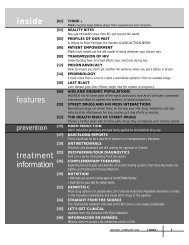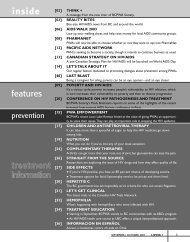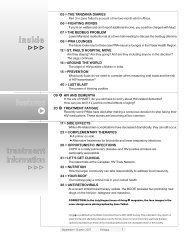liv poz mag.qxd - Positive Living BC
liv poz mag.qxd - Positive Living BC
liv poz mag.qxd - Positive Living BC
You also want an ePaper? Increase the reach of your titles
YUMPU automatically turns print PDFs into web optimized ePapers that Google loves.
Feature Story<br />
and notes that future messages must be culturally and age<br />
appropriate. The reality is that PWAs aren’t on the<br />
national aging radar, and the time to change that is now.<br />
By 2015, the majority of<br />
PWAs in Canada will be<br />
over the age of 50.<br />
Some preliminary work has been done. In October 2009,<br />
the Canadian Working Group on HIV and Rehabilitation<br />
(CWGHR) received funding to prepare a background paper<br />
on HIV and aging. The paper framed the dialogue at their<br />
2010 Partners in Aging National Forum, held in early March<br />
as a satellite meeting at the 6th Canadian HIV/AIDS Skills<br />
Building Symposium in Montreal. The symposium brought<br />
together Canada’s leaders in the HIV/AIDS and gerontology<br />
communities for the first time to discuss emerging trends<br />
and priorities, exchange information and experiences,<br />
consider best practices, and pave a strategic and collaborative<br />
way forward.<br />
The Partners in Aging forum included community<br />
representatives from geriatrics and HIV, doctors, service<br />
providers, and representatives from the research community.<br />
Senator Sharon Carstairs, chair of the Special Senate<br />
Committee on Aging and a member of the forum’s national<br />
advisory committee, gave a keynote address. Senator<br />
Carstairs has been a tireless champion for end-of-life<br />
palliative care and seniors issues. While the forum raised a<br />
lot more questions than answers, it did play an important<br />
role in getting this issue into the forefront and getting it<br />
into the overall national discussions.<br />
Taking charge of the issues<br />
One of the important issues raised by the forum was very<br />
clear: if we don’t start to address the issues faced by those<br />
aging with HIV now, the issues will be addressed for us,<br />
since we’re only a small subpopulation in a much larger<br />
pool of aging Canadians. Having to hide our HIV status<br />
in long-term care facilities, or receiving inadequate care<br />
without medications and income security is already a<br />
reality, and it will worsen if not addressed.<br />
The HIV/AIDS community can have a huge impact on<br />
the direction of our future care if we’re at the table. From<br />
our activist roots and track record of demanding patient<br />
and citizen voice in all aspects of our care for over two<br />
decades, we have a lot to offer to our partner groups.<br />
We must start now to build bridges with existing organizations<br />
that are dealing with seniors and aging issues and<br />
get HIV on the table. These will include prevention<br />
issues for the aged, as well as ensuring care facilities are<br />
stigma- and discrimination-free, if and when PWAs need<br />
to go into care facilities. Also, more research is needed to<br />
ensure we remain healthy as we <strong>liv</strong>e with HIV and other<br />
co-morbidities.<br />
CWGHR is well positioned with the Episodic Disabilities<br />
Network to build on its existing relationships among<br />
the various national partners and bring other groups of<br />
interest together at the table; this will be key to moving<br />
HIV issues on the larger aging platform. In addition to<br />
its involvement in various research projects on HIV and<br />
rehabilitation issues, CWGHR is also focusing on the<br />
issue of aging.<br />
All levels of government, private industry, the health<br />
community, community leaders, and special interest<br />
groups must work together effectively if we want to have<br />
the necessary services and supports in the future. Affecting<br />
change in public policy and service provisions takes years,<br />
and within the next 15 to 20 years many of our membership<br />
at <strong>BC</strong>PWA will be retired or very close to it. 5<br />
Future updates and videotapes of previous<br />
sessions are online<br />
CWGHR will be holding a second forum on aging and HIV in<br />
Toronto before its annual general meeting in June 2010.<br />
Information on the upcoming forum is available at the Canadian<br />
Working Group on HIV and Rehabilitation website at<br />
www.backtolife.ca. As well, links to the videos of the speaker<br />
panels and discussion of the Partners in Aging Forum held in<br />
March are available at the website.<br />
Glyn Townson is the chair of <strong>BC</strong>PWA.<br />
Sarah Burdeniuk is the communications<br />
coordinator at the Canadian Working Group<br />
on HIV and Rehabilitation.<br />
22 <strong>liv</strong>ing5 MayqJune 2010











